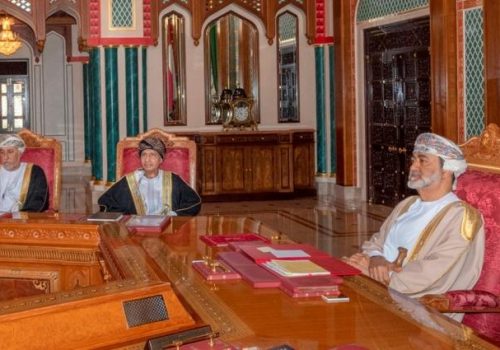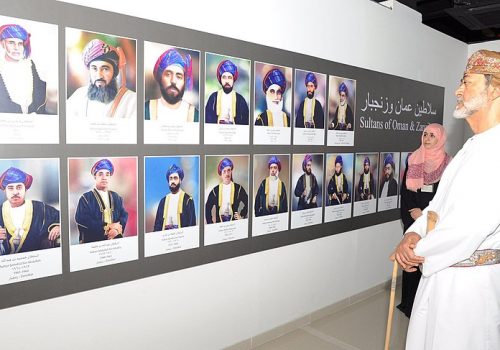Oman designates a crown prince, a first for the country
January 11 marked the first anniversary of Sultan Haitham bin Tareq’s selection as the successor to Sultan Qaboos bin Said. While there were no official celebrations, the government marked the event with a series of announcements and many Omanis congratulated the Sultan on the first anniversary of his rule. On January 10, Sultan Haitham marked the occasion with a ceremony in which he conferred medals and promotions on a number of senior officials, members of the royal family, ministers, and commanders of the Sultan’s Armed Forces and Royal Oman Police. There were also many messages remembering Sultan Qaboos and commemorating his many contributions to the building of the modern Omani state and society.
The next day, Sultan Haitham promulgated two royal decrees which, among other things, changed the process of succession by declaring his intent to designate a crown prince. There were always questions about future leadership during Qaboos’ forty-nine years of rule, since he had no children and Oman’s constitution was vague about the procedure of selecting his successor. The constitution called for the process to be decided by a Ruling Family Council or, if they could not reach consensus, for a committee of senior officials to open a sealed letter that would reveal Qaboos’ choice. When Qaboos’ struggle with cancer became widely known during the last five years of his reign, the succession question became Oman’s most important political issue, even if public discussion of it was frowned on.
When I arrived in Muscat as US ambassador in January 2016, I was told that the ruling traditions of Oman, presumably influenced by religious beliefs of the Ibadi branch of Islam—followed by a majority of Omanis—called for a council of elders to choose the best suited member of the royal family to become Sultan. In other words, it would be contrary to Omani religious and political tradition to follow the model of other Arab Gulf states and identify a crown prince while the current Sultan is alive. This approach to succession was considered part of what made Oman different from the rest of the Gulf. Yet it also had its downsides, as there was always the possibility of divisions among the senior Al Said family members.
Nevertheless, when the time came and Sultan Qaboos died, the system worked with remarkable smoothness and efficiency. Members of the Ruling Family Council, along with members of the Majlis Oman legislative and deliberative branches, came together at dawn at the Al Alam Palace, where Deputy Prime Minister Fahd bin Mahmoud announced that the royal family had agreed to choose whomever Sultan Qaboos had identified. Royal Office Minister Sultan Al Nu’mani and Royal Diwan Minister Khalid Al Busaidi then opened the letter and read aloud the choice of Qaboos’ royal cousin, then Minister of Culture and Heritage, Haitham bin Tariq. Sultan Haitham proceeded to give a brief speech and received the congratulations of those in attendance, and the process was over in less than an hour. Omanis and foreign residents alike breathed a sigh of relief that the process had gone so quickly and smoothly.
By announcing the creation of the position of crown prince, Sultan Haitham has further consolidated his rule and remade Oman’s most powerful institution. On January 12, an amendment to Oman’s basic laws was announced, establishing the Sultan’s eldest son as crown prince from the age of twenty-one. This indicates that Dhi Yazin bin Haitham, a former diplomat whom Sultan Haitham appointed to be Minister of Culture and Youth in August 2020, is now crown prince, although there has yet to be an official announcement. The succession in Oman will thus become predictable, and uncertainty that could lead to unrest will become less likely. The role of Oman’s royal family and its most senior members will thereby become more similar to the rest of the Gulf states. My sense is that most Omanis welcome the change because they place great value in the stability and predictability of political rule in a deeply uncertain world.
Ambassador Marc J. Sievers is a nonresident senior fellow for Middle East Programs at the Atlantic Council. Ambassador Sievers retired in 2019 as a career member of the senior foreign service, having most recently served as US Ambassador to Oman from January 2016 until November 2019.
Image: FILE PHOTO: Sultan Haitham bin Tariq al-Said gives a speech after being sworn in before the royal family council in Muscat, Oman January 11, 2020. REUTERS/Sultan Al Hasani/File Photo


